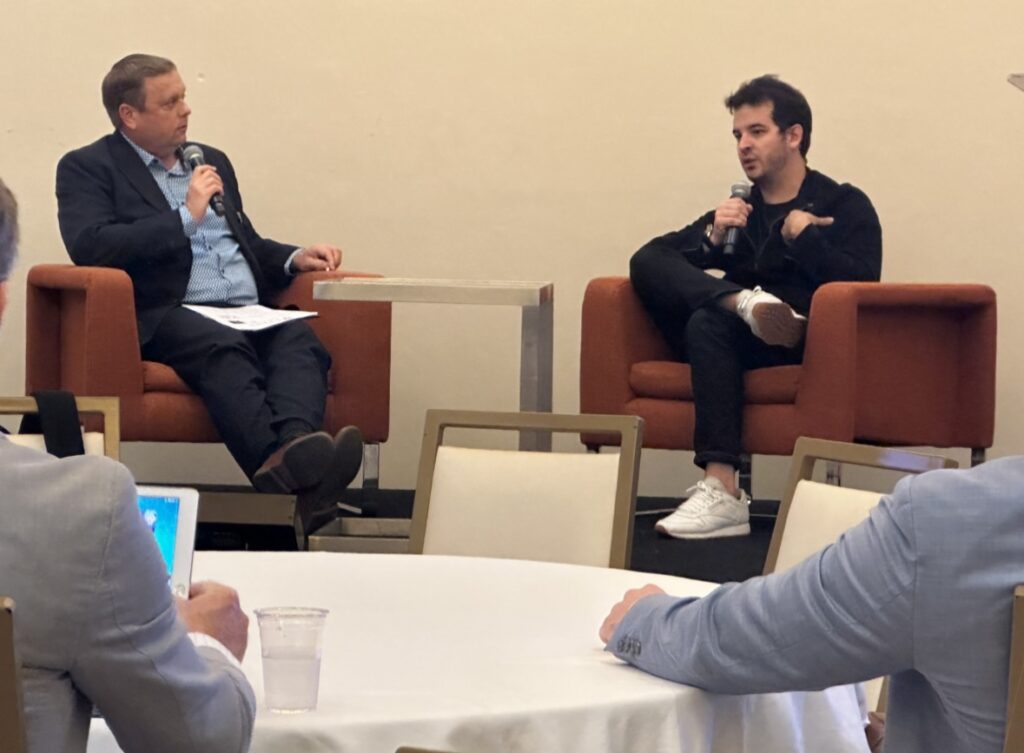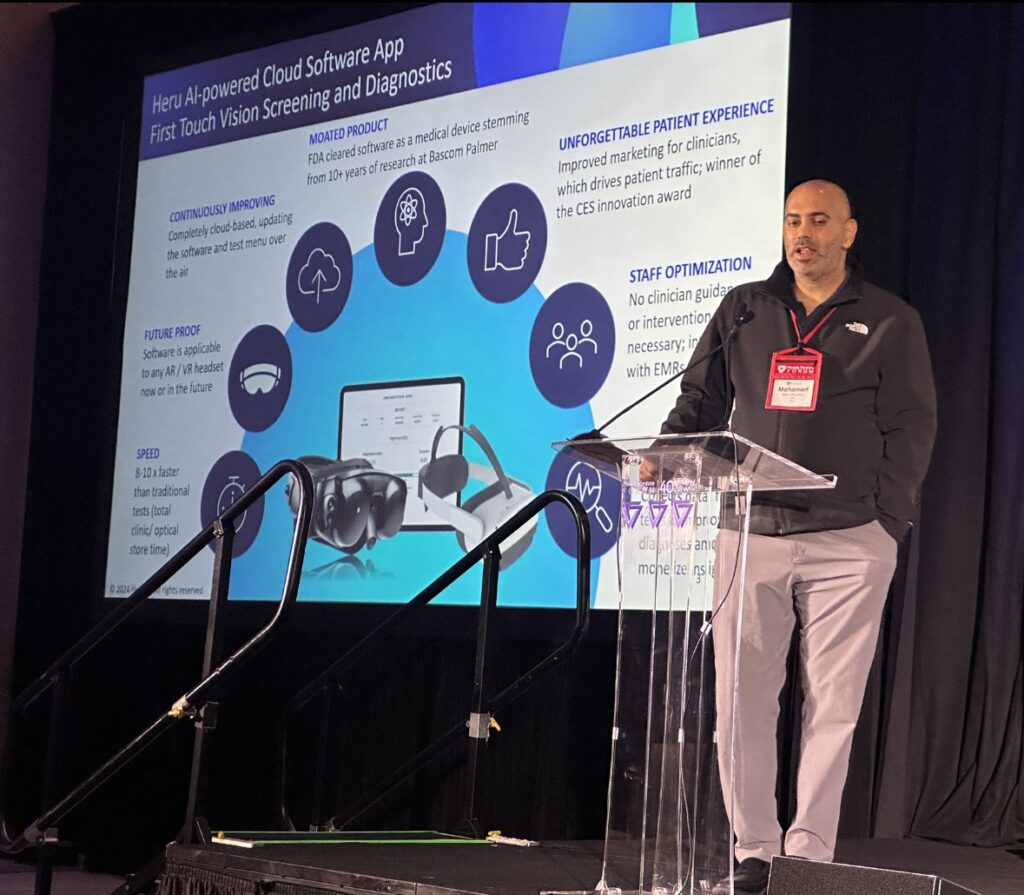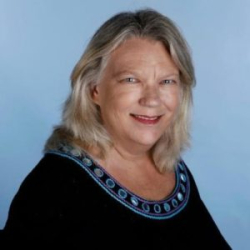By Nancy Dahlberg
As 2024 gets underway, more than 800 investors, founders, community leaders and service providers gathered on Thursday for the Florida Venture Capital Conference in downtown Miami. More than 50 startups presented at the conference and most were fund-raising, while other startups were working the halls. The mood was celebratory despite the venture capital industry’s bleak year in 2023.
After a frothy 2021 and 2022, Florida investors, like those elsewhere, pulled back in 2023 amid the interest rate hikes, inflation trends and fears of a recession. Yet after that “reset” year that brought a renewed focus on fundamentals (and some lower valuations), investors this year seemed open for business.
The outlook for the new year? “Cautiously optimistic.”
The conference, which attracted about 200 investors from over 100 funds, offered a good podium to remind people that Florida is still growing, though not at the pandemic-time pace. And did you know 38,000 tech companies employing 440,000 people call Florida home? In 2021 and 2022, the state was No. 1 for new technology businesses established.
And there’s this: Florida’s $1.4 trillion GDP ranks as the 14th largest in the world, said Kevin Burgoyne, president and CEO of the Florida Venture Forum, the 40-year-old statewide venture organization that produced the conference.
“Florida is hot. There has been a continuous increase in fintech, AI, robotics and aerospace and defense,” added Frank Dibello, who recently retired from the helm of economic development agency Space Florida.
A panel of investors seemed to echo that tone, adding that the recent migration of talent from California and New York has helped seed “a great breeding ground” for innovation. “The perceptions about Florida are shifting bigtime. Everyone wants to be here,” said Dana Sadovnik of Radian Capital.
Of the over 50 companies that presented during the conference, 22 of them were early-stage startups while the rest were growth stage or in healthcare, which for the first time had its own track within the conference. Over the years, more than 2,000 entrepreneurs who have pitched at previous conferences have gone on to raise over $16 billion in capital, Burgoyne said.
Perhaps not surprisingly, many of the companies presenting on Thursday touted their AI capabilities. “AI is becoming a competitive requirement,” said Kathy Chu, co-founder and managing partner of the Orlando-based DeepWork Capital.
Samuel Urquijo, founder and CEO of Keybe.ai, pitched a solution that employs AI to help boost sales for the car industry, but said the startup plans to scale its technology in other industries such as healthcare. The Miami company’s AI-driven SaaS streamlines conversational commerce to enhance business conversions by enabling sales agents to focus on closing deals.

Heru of Miami is an AI-powered app for vision screening and diagnostics. Its software, which runs on commercially available VR headsets, increases the productivity of the doctor and clinic by more than 30%, and is especially useful in remote areas and other areas experiencing staff shortages, said CEO Mohamed Abou Shousha.

Seth Freedman, CEO of Intelligent Observation, also of Miami, discussed the startup’s SaaS platform used by hospitals to reduce infections and their associated costs. Intelligent Observation’s patented technology accurately monitors hand hygiene compliance of clinical staff members before, during and after patient interactions. Other South Florida startups that presented at the conference included OKY, a fintech that recently raised $2 million, EVQLV, Streann Media and Freebee, to name a few.
From a stage in the networking area of the conference, Mark Volchek, founding partner of Las Olas Venture Capital, reminded the startups in the room that many of the world’s best companies were started during tough times. A founder’s top priority should be to build a best-in-class business with great traction, not fundraising, he said. But if you are fund-raising, research your potential investors thoroughly, prepare multiple compelling pitch decks for specific scenarios, and be sure you know your metrics and market thoroughly, he said. The best timing for your fundraising round should be based on your burn rate and milestones, Volchek advised the startups. “Network and build relationships with potential investors well before you need the money.”

Allison Robinson, founder of The Mom Project that has helped millions of mothers since 2016, shared her story at the conference’s Women in Capital Luncheon. Her why? “40% of American women leave the workforce after having children…. Our goal is to create $1 billion in economic opportunities for moms.”
Now a Miami resident, Robinson recently stepped down as CEO after an 8-year run because she suffered from challenges with burnout and founder mental health. She is now chairwoman of the company, which allows her to focus more on long-term strategy for The Mom Project. “Realize your superpowers, double down on those and hire for your gaps,” she said.
While The Mom Project is a social impact company, the business opportunity is immense, she says, and her investors agree. Indeed, the company has raised $116 million, according to Crunchbase. Her investors, particularly Initialized Capital that led her Series A, became strong advocates for the business. “Alexis [Ohanian] became an amazing megaphone for what we are doing and became such an outspoken advocate for paid family leave.”

READ MORE IN REFRESH MIAMI:
- Refresh Miami’s 2023 in Review: Bezos, Brightline, AI, a climatetech hub & more: There were many #MiamiTech wins to celebrate in 2023
- Founder look-ahead: #MiamiTech founders usher in the new year with these predictions and resolutions
- Investor look-ahead: Miami VCs share their outlook on the 2024 startup ecosystem
- By the numbers: LatAm VC in 2023
- South Florida VC fundings in Q4 rose, but results for 2023 are a 3-year low
- 8+ things to know in #MiamiTech: Big role for Matt Haggman plus news about On.Energy, VC, Betr, Chewy, TokenizeThis, FreshCodes, Magic Leap & more. - April 26, 2024
- Human ingenuity, inspiration, a call to action: Miami Tech Talent Coalition takes the stage at eMerge Americas - April 24, 2024
- Miami Tech Month, where developers get their own conference, VCs take the stage, and anything is POSSIBLE - April 23, 2024





